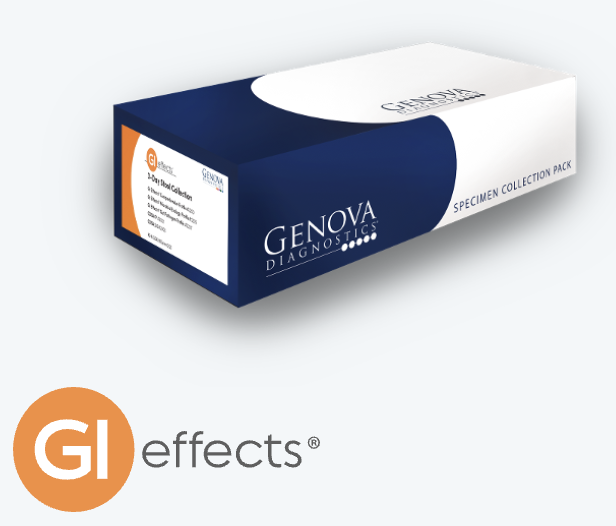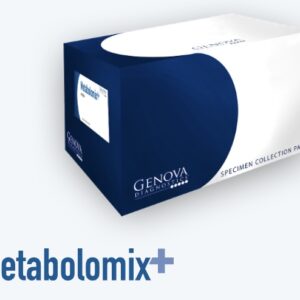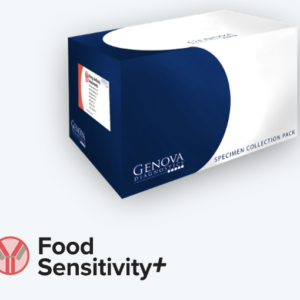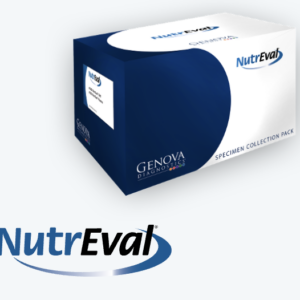Testing – GI Test
$499.99
The GI Effects® Comprehensive Stool Profile provides valuable insight into digestive function, intestinal inflammation, and the intestinal microbiome.
SPECIMEN TYPE: STOOL
TURNAROUND TIME: 17 DAYS
Description
The GI Effects Stool Profiles are a suite of advanced stool tests that provide immediate, actionable clinical information for the management of gastrointestinal health. Utilizing cutting-edge technologies and biomarkers, these profiles offer valuable insight into digestive function, intestinal inflammation, and the intestinal microbiome. The overview pages make results interpretation quicker and easier, to prioritize treatment and assess microbiome status.
The GI Effects Stool Profiles can reveal important information about the root cause of many common gastrointestinal symptoms and non-GI conditions including:
- Gas
- Bloating
- Indigestion/ reflux
- Abdominal pain/ cramps
- Diarrhea
- Constipation
- Inflammatory Bowel Disease (IBD)
- Irritable Bowel Syndrome (IBS)
- Atopic dermatitis/ eczema
- Allergies
- Autoimmune diseases
- Mood disorders (depression)
- Joint aches
- Diabetes
- Weight issues
The health of the entire body is dependent on a healthy gut and gut microbiome. Gut microbes are codependent with one another and with their human host, and the health of one affects the other. A sizeable volume of research associates a dysbiotic, or imbalanced gut microbiome with multiple disease states both within and outside of the GI tract. The diverse metabolic activities of the microbiome ultimately impact the human host, and the activities of the human host ultimately affect the health of their microbiome.
The biomarkers on the GI Effects Comprehensive Profile (2200) reflect the 3 key functions of gut health arranged in the “DIG” format: Digestion/Absorption, Inflammation/Immunology, and the Gut Microbiome:
Digestion/Absorption:
- Pancreatic Elastase-1 is a marker of exocrine pancreatic function.
- Products of Protein Breakdown are markers of undigested protein reaching the colon.
- Fecal Fat is a marker of fat breakdown and absorption.
Inflammation/Immunology:
- Calprotectin is a marker of neutrophil-driven inflammation. Produced in abundance at sites of inflammation, this biomarker has been proven clinically useful in differentiating between Inflammatory Bowel Disease (IBD) and Irritable Bowel Syndrome (IBS). [1,2]
- Eosinophil Protein X is a marker of eosinophil-driven inflammation and allergic response.
- Fecal Secretory IgA is a marker of gut secretory immunity and barrier function.
- Fecal Occult Blood Test detects hidden blood; fecal immunochemical testing (FIT) has been recommended by the American College of Gastroenterology as the preferred noninvasive test for colorectal cancer screening/detection.
Gut Microbiome:
- Genova is the first laboratory to introduce an Inflammation-Associated Dysbiosis score and a Methane Dysbiosis score by incorporating our latest, published microbiome data analysis.22
- Metabolic indicators, including short-chain fatty acids and beta-glucuronidase, demonstrate specific and vital metabolic functions performed by the microbiota.
- Commensal Bacteria demonstrate the composition, abundance and patterns of gut organisms.
- More than 95% of commensal gut organisms are anaerobic and are difficult to recover by traditional (aerobic) culture techniques.
- GI Effects assesses a set of 24 genera/species that map to 7 major phyla.
- 16S rRNA gene polymerase chain reaction (qPCR) amplification technique
- Comprehensive microbiome analysis included
- Bacterial and mycology cultures demonstrate the presence of specific beneficial and pathogenic organisms.
- Matrix Assisted Laser Desorption Ionization Time-of-Flight Mass Spectrometry (MALDI-TOF MS) technology is used for limitless bacterial and fungal species identification via culture
- Bacterial and mycology sensitivities are provided for pathogenic or potentially pathogenic organisms that have been cultured. The report includes effective prescriptive and natural agents.
- Parasitology includes comprehensive testing for all parasites on every parasitology exam ordered.
- GI Effects provides microscopic fecal specimen examination for ova and parasites (O&P), the gold standard of diagnosis for many parasites.
- 6 Real-time Polymerase Chain Reaction (PCR) targets detect common protozoal parasites including Blastocystis spp., Cryptosporidium parvum/hominis, Cyclospora cayetanensis, Dientamoeba fragilis, Entamoeba histolytica, and Giardia. PCR for organisms is emerging as a highly sensitive method for infectious organism detection.
- Selection of a one-day or three-day sample collection is based on the clinician’s clinical index of suspicion for parasitic infection. If there is no/low suspicion, a one-day sample will likely be adequate. For high suspicion, a three-day sample collection is optimal.
Additional information
| GI Test | GI testing. |
|---|
Only logged in customers who have purchased this product may leave a review.





Reviews
There are no reviews yet.